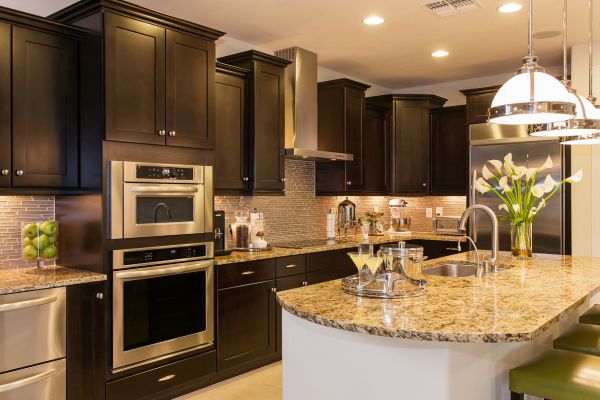Smart kitchens are no longer a futuristic fantasy. They’re here, in real homes, changing the way we cook, store food, and even make grocery lists. But like anything that’s tech-driven, they come with both perks and drawbacks. If you’re considering upgrading to a smart kitchen, you’ll definitely want to weigh the pros and cons of smart kitchens before making the leap. Let’s dig in.
What Exactly Is a Smart Kitchen?
Before diving into the pros and cons of smart kitchens, it helps to understand what we’re actually talking about. A smart kitchen isn’t just one fancy gadget—it’s the whole ecosystem. Think refrigerators that remind you when you’re out of milk, ovens you can preheat from your phone, faucets that respond to voice commands, and coffee makers that sync with your morning alarm. Basically, it’s the blend of traditional kitchen appliances with internet connectivity, automation, and artificial intelligence.
The idea is simple: save time, make cooking easier, and maybe even cut down on waste. Sounds dreamy, right? But let’s be real—smart doesn’t always mean perfect.
The Pros of Smart Kitchens
Convenience That’s Hard to Beat
Imagine you’re stuck in traffic and realize you forgot to preheat the oven. With a smart oven, you just pull up an app on your phone and boom—dinner’s already warming up when you walk through the door. That level of convenience is one of the biggest selling points of smart kitchens.
Smart fridges can track expiration dates, suggest recipes based on what’s inside, and even order groceries for you. That’s a game-changer for busy families or anyone who hates running last-minute errands.
Energy Efficiency and Cost Savings
Smart appliances are usually designed to be energy-conscious. Many of them adjust their settings automatically to reduce energy waste. For example, a smart dishwasher might delay its cycle until off-peak hours when electricity rates are lower. Over time, these small adjustments can lead to noticeable savings on your utility bills.
Better Food Management
We all know the frustration of tossing out forgotten leftovers or expired groceries. Smart refrigerators can actually help reduce food waste by keeping track of what’s inside and sending reminders before things go bad. Some even let you peek inside remotely while you’re at the store—so no more guessing if you still have eggs.
Enhanced Safety Features
Burners that shut off automatically, leak detectors that alert you through your phone, ovens that won’t overheat—smart kitchens add an extra layer of safety. For households with kids or older adults, these features can be a real lifesaver.
The Cons of Smart Kitchens
The Cost Factor
Here’s the thing: smart kitchens aren’t cheap. Outfitting your space with smart appliances can easily run into thousands of dollars. Even smaller upgrades, like a voice-activated faucet, come with a premium price tag. While they might save money on energy in the long run, the upfront investment is no small thing.
Technology Glitches and Updates
Like all tech, smart appliances aren’t immune to glitches. Sometimes apps don’t sync properly, or software updates bring more headaches than improvements. Imagine your fridge suddenly refusing to connect to Wi-Fi or your oven’s app crashing right when you’re hosting a dinner party. Not fun.
Security and Privacy Concerns
Smart kitchens rely on constant internet connectivity, and that opens the door to potential security risks. Hackers targeting appliances may sound far-fetched, but it’s a real concern. Plus, some smart devices collect data about your habits—like what you eat or how often you cook—which can feel a bit invasive.
Dependence on Internet and Power
The smarter your kitchen, the more it depends on stable Wi-Fi and electricity. If your internet goes down, you may not be able to access some of your appliances’ best features. And let’s be real, the last thing anyone wants is a “smart” coffee maker that refuses to brew because of a glitchy connection.
Learning Curve and Overcomplication
Not everyone wants to fiddle with apps and voice commands just to boil water. For some people, the old-fashioned twist of a knob feels simpler and less frustrating. The truth is, smart kitchens can sometimes overcomplicate things that were once straightforward.
Are Smart Kitchens Worth It?
So, after weighing the pros and cons of smart kitchens, where does that leave us? Honestly, it depends on your lifestyle. If you’re a tech enthusiast who loves convenience and efficiency, a smart kitchen might feel like a dream come true. On the other hand, if you’re someone who prefers simplicity—or you’re wary of spending thousands on appliances that might need constant updates—you might want to wait until the tech matures a little more.
Smart kitchens aren’t a one-size-fits-all solution. They’re amazing for some households but impractical for others. The key is figuring out what matters most to you: saving time, saving money, or just keeping things simple.
Final Thoughts
The pros and cons of smart kitchens show us one thing: technology in our homes is evolving fast, and the kitchen is no exception. These upgrades can make life easier, safer, and more efficient. But they also come with costs, potential glitches, and a learning curve that not everyone wants to tackle.
If you’re thinking about jumping in, maybe start small—pick one smart appliance and see how it fits into your routine. From there, you can decide whether a fully connected kitchen is worth the hype or if you’re happier sticking to the basics. At the end of the day, the best kitchen is the one that makes your life easier, whether it’s powered by Wi-Fi or just good old-fashioned elbow grease.




